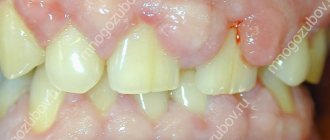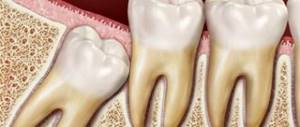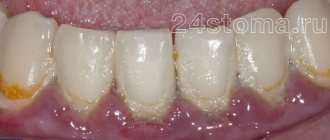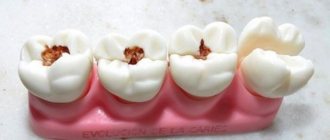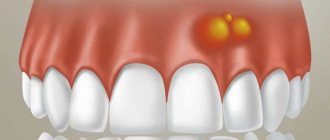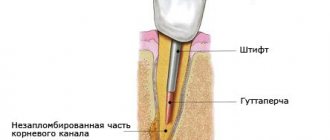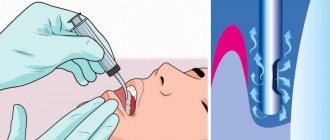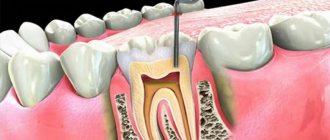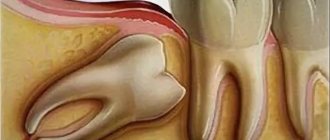Author of the article:
Soldatova Lyudmila Nikolaevna
Candidate of Medical Sciences, Professor of the Department of Clinical Dentistry of the St. Petersburg Medical and Social Institute, Chief Physician of the Alfa-Dent Dental Clinic, St. Petersburg
Toothache is a painful condition that is inevitably accompanied by insomnia and loss of appetite. But if the pain gives rise to a high temperature, under no circumstances should you postpone a visit to the dentist. Such a manifestation requires immediate treatment.
Mechanism of caries development
Caries, according to experts, is the most common disease in the world, occurring in more than 90% of the world's population. Despite this, many people have only a superficial knowledge of tooth decay. Therefore, questions often arise about possible symptoms of the disease, in particular, whether the temperature can rise with caries. To understand, let’s first consider what the carious process is. Essentially, this is the slow destruction of a tooth under the influence of various factors, the main ones of which are oral bacteria and carbohydrate foods.
Microbes with cariogenic effects feed on sugars and convert them into acids, which cause destruction of dental tissue. If a person does not remove plaque (colonies of bacteria on teeth) well and at the same time eats a lot of carbohydrates, he creates favorable conditions for the development of caries.
This pathological process in most cases develops gradually. Acids first attack the enamel, then penetrate the dentin, damaging the dental tissues deeper and deeper. If caries is not cured in time and the deep spread of pathology is not stopped, sooner or later caries will develop into pulpitis or periodontitis. These are severe conditions in which the tissues of the pulp (neurovascular bundle) and periodontal tissue (they surround the tooth) become inflamed.
Causes of dental inflammation
Bacterial damage to dental tissues can occur due to poor oral hygiene and insufficient patient attention to dental health issues. Among the common reasons:
- gum pathologies (periodontitis, periodontal disease, gingivitis);
- spread of caries;
- dental cysts, granulomas;
- cracks, chips on the tooth surface;
- oral injuries (for example, while eating);
- untimely change of toothbrush;
- poor quality teeth cleaning;
- weakening of the immune system.
However, the source of infection can be located in other parts of the body, and bacteria are carried into the gums by the bloodstream. Therefore, close attention should be paid to the treatment of any infectious diseases (especially ENT diseases) and increasing immunity.
What are the symptoms of caries?
Symptoms of caries directly depend on its stage, that is, on how deep the damage is.
- Spot stage.
The earliest stage of caries development is practically asymptomatic. Nothing bothers the person, there is no hole in the tooth, but the process of demineralization of the enamel has already begun. This is indicated by a small white spot. Of course, at the early stage of caries the temperature does not rise.
- Superficial caries.
This is the stage when a hole appears in the tooth, but it is still concentrated in the enamel area and has not spread to the dentin. The doctor can easily detect a defect in the tooth surface during a visual examination. At this stage, pain may occur in response to irritants (hot or cold, sweet or salty food), and the sensitivity of tooth enamel may increase. Body temperature is normal.
- Average caries.
It is characterized by periodic pain and a carious cavity, which is easy to feel even with the tongue. As in earlier stages, with average caries the temperature does not rise.
- Deep caries.
This is the latest stage of the carious process. The bottom of the carious cavity is located in close proximity to the pulp, the sensitive part of the tooth. Therefore, a person feels acute pain and discomfort while eating. Pain also occurs during a dental examination using a probe. Although deep caries is the most advanced form of the disease, even this stage is not characterized by an increase in temperature.
Thus, with ordinary caries the temperature should not rise. However, complications of an advanced carious process can lead to such a symptom.
Symptoms of physiological and pathological eruption of wisdom teeth
Tooth eruption can occur physiologically or pathologically. Discomfort occurs in any case, but if the “eight” grows without complications and other teeth do not interfere with it, inflammation usually does not occur. The complex of symptoms may vary, but most note the appearance of such phenomena as:
- engorgement and hardening of the gums;
- distension in the area of eruption;
- aching pain of varying intensity.
Important! Symptoms can vary significantly from person to person. Even one patient can experience completely different sensations when wisdom teeth erupt on the lower and upper jaws.
Severe pain, tumors, and inflammatory processes accompany pathological eruption. In this case, saving the tooth is not always advisable. If your wisdom tooth is cutting out and your gums hurt, you need to see a dentist.
Signs of pathological eruption are:
- constant, intense, aching pain;
- swelling of the gums or cheeks;
- inflammation of the lymph nodes;
- pain when swallowing;
- temperature increase.
Are you experiencing one or more symptoms? Don't delay your visit to the doctor. Such phenomena may be a sign of pericoronitis, purulent inflammation, abscess and other pathologies. Without adequate treatment, the inflammatory process will spread to adjacent tissues, and phlegmon will form in the oral cavity. In advanced cases, the problem can only be dealt with surgically in a hospital setting. Purulent inflammation is opened through external incisions, the treatment process is accompanied by the use of antibiotics.
Even if the symptoms of wisdom tooth eruption do not cause concern, it is recommended to visit a dentist. This is necessary to exclude a pathological process.
The doctor will refer you for an x-ray or computer examination. It helps determine the position of the new tooth relative to the existing ones and assess whether there is enough space for it. The photographs clearly show any deviations in the figure eight position. Based on the examination, the doctor will decide whether the wisdom tooth needs to be removed.
The danger of fever due to toothache
Thus, if toothache and other dental symptoms are accompanied by an increase in temperature, in most cases these are indicators of pulpitis or periodontitis. Without treatment, these diseases can be dangerous because the infection will spread to other organs. Therefore, if an adult or a child’s body temperature rises during toothache, you should immediately consult a doctor.
Sore throat after dental treatment
It happens that after treatment, a patient not only has a toothache and fever, but also a sore throat. What are the reasons?
Firstly, a sore throat could be present before treatment and intensify after visiting the dentist, in a qualitative response of the body.
Secondly, it is rare, but it still happens that the doctor touches the mucous membrane of the throat with an instrument.
And finally, thirdly, pain after tooth extraction or treatment can radiate to the throat.
All of the above can cause a sore throat after visiting the doctor, but in rare cases, pain may occur several days after taking it.
Why does the temperature rise after caries treatment?
Sometimes a slight increase in temperature is observed after treatment of the carious process. Most often this happens in the following cases:
- After a complex invasive procedure, such as root canal cleaning. This is how the body reacts to interference.
- In case of infection (after therapy for purulent periodontitis with a cyst or granuloma). An infectious process can occur due to unprofessional treatment, as well as if the patient does not follow the dentist’s recommendations after the procedure.
- Severe stress. It's no secret that even some adults are afraid to have their teeth treated, and a natural reaction to stress can be an increase in body temperature.
- Sometimes an elevated temperature is nothing more than a symptom of an incipient ARVI, which simply coincided with a visit to the dentist.
If you have a fever after treatment for caries or another dental problem, you should pay attention to your general condition. If you feel normal, if the thermometer does not show above 38°, you can wait a couple of days until the temperature returns to normal. If this does not happen on the third day, you should consult a doctor.
You cannot postpone a visit to the dentist if the temperature is very high (38.5-40 degrees), there is general weakness, headache, inflammation of the lymph nodes, severe pain in the area of the treated tooth, redness and swelling of the gums. Such symptoms may indicate a progressive inflammatory process.
Is it possible to treat teeth if you have a cold?
If the high temperature is caused by ARVI, herpes or other infectious diseases, then it is better to reschedule the appointment. The body at this moment is weakened and tuned to eliminate the disease, which means that the recovery process after dental treatment will be delayed. If you have a runny nose or cough, it will be difficult to sit in the dental chair during treatment. In addition, there is a high risk of spreading infection to the staff and other patients of the clinic.
However, there are situations when treatment cannot be delayed. In this case, you need to consult with your doctor, preferably by phone. He will decide whether to subject the weakened body to dental intervention or not.
In what other cases does hyperthermia occur?
Is it possible that fever after tooth extraction is not associated with infection or tissue injury? Yes, this reaction of the body is sometimes caused by an allergy to anesthetics or other drugs used during the operation. The swelling that occurs at the injection site, for example, also helps to activate the body's defenses. It “seems” to him that the condition is critical and atypical, as it is characterized by the accumulation of a large amount of fluid in the tissues and increased pressure. Hyperthermia helps fight swelling.
For many, going to the surgeon is a stressful situation. It is accompanied by fear, discomfort, pain. The hyperthermic reaction is natural in this case. This is psychosomatics.
Hyperthermia that occurs after visiting a dental surgeon can be caused by an acute respiratory viral infection (ARVI). This is either a coincidence, or the operation simply weakened the body’s defenses, allowing viruses to “rule the roost.”
How long does the temperature last after tooth extraction?
A normal indicator of the thermal state of the human body is considered to be in the range of 35.5–37.0 degrees Celsius. If after tooth extraction the temperature remains between 37–38 degrees (it is also called low-grade fever), then there is nothing terrible about it. Everything should return to normal in 1–3 days. If the thermometer shows 38–39 degrees, this may indicate complications. The body gives an SOS signal. You should consult a doctor.
A value of 39.2 degrees is considered critical. In this case, you need to call an ambulance.
Any hyperthermic reaction lasting more than 3 days is a good reason to consult a doctor. This is especially true when, in addition to an increase in the thermal state indicator, there are other alarming symptoms.
Are fevers associated with tooth extraction dangerous for children?
Milk teeth also sometimes have to be removed, for example, if they interfere with the growth of permanent teeth or are too damaged and cannot be restored. Dental extraction in children is also a surgical procedure. However, we are usually talking here about a simple removal, in which the doctor separates the gum from the crown and removes the latter with forceps. A wound is formed, but it is small. Temporary teeth, as a rule, do not hold tightly, so their extraction is almost bloodless and painless.
If, after tooth extraction, the child’s temperature is 37 degrees or more, then this is not the norm. If you have this symptom, you should definitely consult a doctor (dentist, pediatrician).
